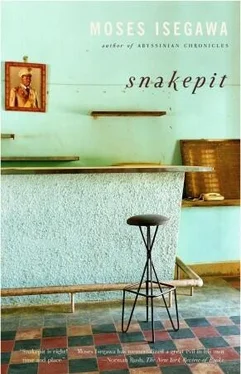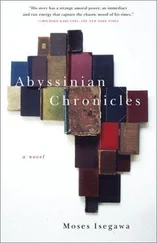Shortly before nine, she went to the kitchen to decide what to cook. She wanted to prepare Bat’s favourite steamed bananas with fish or meat. She had dry fish in the house but no meat. The prospect of going to town for meat made her change her plan. She decided to cook fish. She soaked it in water to make the flesh tender. She made everything ready for the fire.
Shortly before ten she went for a bath. It would do her good on this bright sunny day. She filled the tub and slipped in, enjoying herself but keeping in mind not to indulge herself too long because of the cooking. She started dreaming, stretching things out to their blurred edges. Somewhere in the corners of her mind, she thought she heard the sound of a car. Bat never returned home in between leaving for work and lunch. He never forgot things. If this was an exception, she did not mind him finding her in the bath. He would most certainly crack a joke about something or sing at least a few bars of the song which had become their song: “I Can’t Get No Satisfaction.” If a miracle had happened and he had been given a day off, he might join her, re-creating some of the magic of the Grand Empire Hotel. The cooking could wait. They might drink a glass of red wine or beer in the tub and listen to the birds outside. He was bound to get angry with the staff for staying away without giving notice, as if, before moving in with him, she would protest, she had never cooked, shopped, or cleaned. Things are different now, he would counter sharply.
She could see the future of their relationship. Bat had the upper hand now, and she loved it. But over the years she would gain more leverage. He had told her that he loved her most of all because he had found her open, not yet embittered or hardened by the world, not yet set in her ways. They would set together like aging doors.
Suspended halfway between fantasy and reality, she hardly had time to see her visitors. In her eyes the green overalls were just the blurred forms which accompanied a chloroformed patient to unconsciousness, sometimes to oblivion. The visitors were swift, economical. Their scalpels, magnified by her fear, were inflated to the size and brutality of machetes. They towered, hovered, pressed down hard, and applied the speedy efficiency enjoyed by the best in their trade. They disrobed without fuss, cleaned themselves, bagged their garments, and prepared to go. They drank the tea they found in a thermos flask in the kitchen. They washed the cups and the flask and turned them upside down to dry.
AT THE SCHEDULED TIME the XJ10 swept into the yard with a flurry and a crunch of pebbles. Bat leapt out, tie eased, two top buttons undone almost in one movement. He filled his lungs, exhaled loudly, and savoured those few seconds when the wind hit his exposed chest. He pushed the door open, called Babit, but the house returned only his own voice to him, spurned. He called again as he dropped the briefcase on the sofa. He walked to the bedroom. He feared every lover’s worst nightmare: finding one’s lover in bed with another; his was of finding her with Tayari. It lasted a few seconds, but it bit deep. The bedroom was empty. Her clothes, a blue gown with red lines at the neck, and a white shift, were neatly folded, the black shoes near the bed polished, waiting. He felt his anticipation, eagerness, cooling and coagulating into something nasty. She knew how precious their appointment was to him; why had she betrayed it? What did she have to say for herself? Was this the beginning of another phase, the revelation of a Babit he had not yet had occasion to see? Why was he so angry? Because he had come to rely on her, and he wanted it to stay that way. Maybe she was sick; who said she would never fall sick?
He took a few deep breaths and walked out of the bedroom. He saw footprints, large, blurred, pinkish. He called out as he opened the bathroom door. He almost stepped on her head. The torso was in the bath, arms hanging limply on the sides, the wedding ring winking shatteringly in the light.
He did not know if he cried out or just stared. He did not know if he fainted or vomited. It was just clear that things would never be the same again. He could have phoned. It just never occurred to him. The place seemed grotesquely swollen, with an oppressing smell that seemed to emerge from the bowels of hell. He somehow made it to the police station. It was a miracle that he didn’t kill anybody on the way.
At first they thought he was insane, the freshest apparition from the windy domain of psychosis blowing through the land. They got to see a few of those per week as part of the job. But this one looked way out on the extreme outer reaches. Had he killed a general, taken his XJ10, and come to brag about it? Had he also killed the general’s wife? Finally, they got through to him, or he got through to them, and the investigative machinery was nudged into motion. They wanted to detain him longer, but they realized that he would be of no help.
He left and zoomed to the city at an average speed of 160 kilometres an hour. The car was just a green blur steered by self-destruction seeking a quick suicidal release. The soldiers, who were the uncrowned kings of the road, committing every aberration in the book, from pushing cyclists off the tarmac to ignoring speed limits and red lights, sat back and watched in surprise. At the Clock Tower a group of Stingers was escorting a high-ranking officer. Bat drove through them, and before the soldiers could raise their fingers to point and threaten, he was gone. He parked in front of the house, rested his head on the wheel and wondered what to do next. It seemed such a weight to get out and put the tragedy in words. It seemed impossible.
Mrs. Kalanda remembered seeing him standing in the doorway, drenched in sweat, on the edge of despair, with the look of madness and grief in his eyes. The stoic bureaucrat had died, leaving behind a strange incarnation. He released a number of mangled sounds which spelled out a tragedy, of what calibre and sort, she could not tell. He waded through her questions, went to the cupboard and put a bottle of Scotch to his mouth. She had to fight him physically to retrieve the remaining quarter. There is no dignified way to grieve, she thought. Grief makes us totter between childishness and beastliness. The saving grace of wisdom and strength comes later when the poison is drained. He lay on the sofa and groaned, a heart-rending spectacle. He was saying at intervals, “I killed her, I killed her.”
“Why?” she said trying to hold him. “I don’t understand.”
She went to the phone and called her husband and the Professor. They arrived to find Bat sitting on the sofa. He was somewhat calmer and he told them what had happened, what he had seen.
“Head on the bathroom floor!” everyone exclaimed at once. Even in a country tormented by lunatics, even to a group that had trekked to the forest to search for him among the dead, this was gut-wrenching. It was personal in every way. They huddled together, grieving, and tried to make plans. There were people to inform, people who would be hurt by the news. Bat took on the biggest burden: he decided to be the one to inform Babit’s family. Mrs. Kalanda wanted to do it, but he refused.
“It is my responsibility.”
He went with the Professor because he came from the same area as Babit. Also because Bat needed company in case something went wrong on the road. The journey was uneventful. The two men looked grimly in front of them. The Professor had lost a brother. He thought he had a good idea about what his friend was going through. Tired of supporting his sickly wife and getting little in the way of pleasure out of her, he had wished death on her on a number of occasions, but now he believed he had never meant it. The idea of finding her with her head chopped off made him shiver.
Читать дальше











